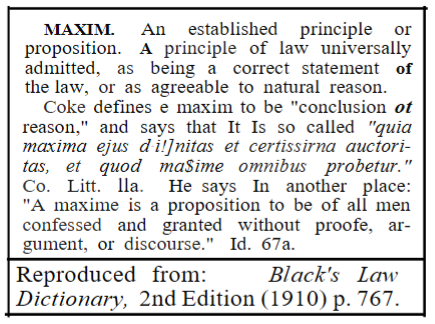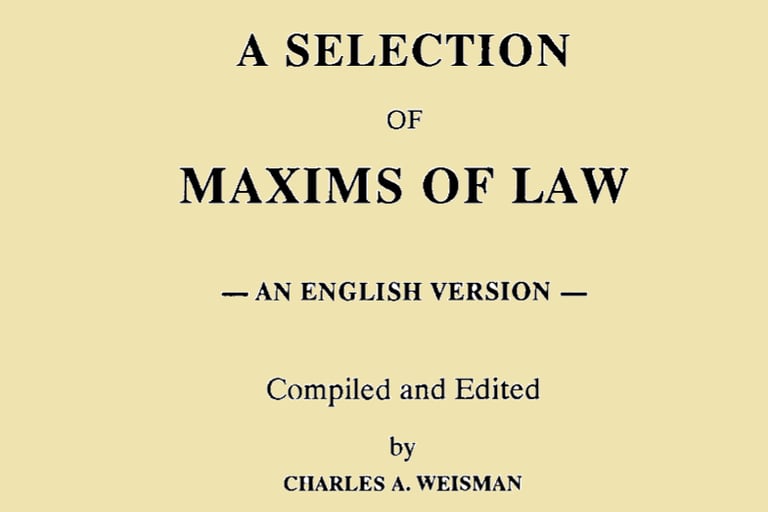SETTLED MAXIMS OF LAW
Maxim of Law: An established principle or proposition. A principle of law universally admitted, as being a correct statement of the law, or as agreeable to natural reason. Coke defines a maxim to be “conclusion of reason,”
The settled maxims of law serve as guiding principles that encapsulate fundamental truths and established norms within the legal system. These maxims, often derived from centuries of judicial reasoning and philosophical thought, provide a framework for interpreting laws and applying justice. They encompass various aspects of legal reasoning, such as "Ignorance of the law is no excuse," which emphasizes personal responsibility and accountability. Other maxims highlight the importance of fairness and equity, such as "He who seeks equity must do equity." In essence, settled maxims of law are indispensable tools that promote clarity and harmony in legal practice.
Settled Maxims of Law
If you are dragged in to a CYS, Domestic Relations, Divorce, Traffic, or any Administrative court, know these are the basis from which our laws are created. These are "settled" and do not have to be proven.
In a world where transparency is paramount, the clandestine actions of lawyers and politicians raise serious ethical concerns. These individuals, often seen as the guardians of justice and fairness, might not even know, or hide the settled maxims of law. By hiding legal principles or manipulating public perception, they undermine the very foundations of trust that society places in the legal system. Such behavior not only erodes public confidence but also perpetuates a cycle of misinformation, leaving citizens in the dark about their rights and the true workings of the law. It is crucial for the public to remain vigilant and demand accountability from those in power, ensuring that the tenets of justice are upheld and accessible to all. Only then can a fair and equitable legal system thrive, serving its intended purpose of protecting the rights of every individual.
Here are a few examples
47a. Whenever the interpretation of liberty is doubtful, the answer
should be on the side of liberty.
47e. Liberty is more favored than all things [anything.]
18e. The custom of all the country is the common law of the country
18c. Things derogatory to the common law are not to be drawn into precedent.
94u. The law wills that, in every case where a man is wronged and endamaged, he shall always have a remedy.
37d. An error which is not resisted or opposed is approved.
PREFACE
In Law, as with any science, there exists certain fundamental principles which form its basis and to which reference must be frequently made in its application. These fundamental principles in law are referred to as "Maxims of Law." Sir William Blackstone says they are "somewhat like axioms in geometry. " Certain Maxims of Law have prevailed throughout recorded history. They can be found in the old English Common Law, in the ancient Roman Law, and can be found in the Bible as well.These maxims of law are so manifestly founded on reason,necessity and Divine precepts, that they have been universally accepted as being true rules and principles of law. They thus have become a part of the general customs and common law of the land of every civilized nation. In describing the established Maxims of Law, Sir Edward Coke,a leading English authority on the law, stated: "A maxim is so called because its dignity is chiefest, and its authority the most certain, and because it is universally approved by all. "
A brief examination of the earlier case reports of England and America will readily show the importance which was attached to the acknowledged Maxims of Law. Maxims were continually relied upon to settle matters dealing with wills, inheritance, land,economics, crime, marriage, property, contracts, rights, and virtually every aspect of law and jurisprudence that would arise. If one fails to understand the fundamental principles of law, then there is no end to which he can be misled or deceived about what is right and what is wrong. Such a person could easily become subject to government encroachments, or be maneuvered into surrendering his rights. This is so because law governs all events and things that concern our lives. Clearly, a failure to have a practical understanding of the Maxims of Law could lead to grievous errors in our actions, no less so than the errors resulting from one's ignorance in the principles of any other science.Maxims of Law, like any other fundamental laws, always hold true and yield the same results under the same conditions. Thus the application of a maxim to a case before the court is generally the only question, not its validity per se.
The true method of making the application is to ascertain how the maxim arose, and to consider whether the case to which it is applied is of the same character, or whether it is an exception to an apparently general rule. Further, the understanding or application of a particular maxim may involve the consideration of other maxims which may guide or clarify its correct meaning or application. Thus, certain situations may involve two or more principles of law which would need to be considered in determining the way the law works or is applied.
In this work I have endeavored to point out the more important Legal Maxims of practical use. An effort was also made to eliminate those maxims of the English law which are not applicable to American Law. Understanding the principles of law in this book can put one at a definite advantage in whatever his endeavors, since so many aspects of our lives are affected by law.
-Charles A. Weisman (6/90)
If you have a lawyer, one of the 1st questions to ask is "Do you know the fundamental principles of law" or the settled maxims of law. If they say no, or they aren't important, get yourself a new lawyer.
Here is another link, if you missed the one at the top of the page. Click on the button above


Why would a judge, an attorney, or a government worker not want you to know about, or make use of such an important part of any court case? The answer to that lies in your Constitutional, God-given, inherent Right to Due Process of Law. If you haven't noticed today's political, economical, social, and global agenda, it's all about taking away your rights. The more rights that can be removed from you, the more power they have to tax, regulate and enslave you. If government can get away with convincing you that they're giving you what you have a right to, they can easily hide what is really yours. And from that, they can get access to your house, your kids, your car, your guns, your health, and smother you in debt with taxes and regulations.
So here's your takeaway from everything on this page and information that will be priceless as government gets more and more intrusive in days and years ahead.
Your right to DUE PROCESS OF LAW is spelled out in both the US Constitution and the Pennsylvania Constitution. It is very specifically defined in law dictionaries and IS NOT what your county or state is giving you.
The Black's Law Dictionary 4th edition gives a most comprehensive, true definition of the due process of law that you are guaranteed, and guess what is included in the definition?
DUE PROCESS OF LAW. Law in its regular courte of administration through courts of justice. 3 Story, Const. 264, 661. "Due process of law in each particular case means such an exercise of the powers of the government as the settled maxims of law permit and sanction, and under such safeguards for the protection of individual rights as those maxims prescribe for the class of cases to which the one in question belongs. "Cooley, Const. Lim. 441.
Whatever difficulty may be experienced in giving to those terms a definition which will embrace every permissible exertion of power affecting private rights,and exclude such as is forbidden, there can be no doubt of their meaning when applied to judicial proceedings. They then mean a course of legal proceedings according to those rules and principles which have been established in our systems of jurisprudence for the enforcement and protection of private rights.
To give such proceedings any validity, there must be a tribunal competent by its constitution—that is, by the law of its creation—to pass upon the subject-matter of the suit; and, if that involves merely a determination of the personal liability of the defendant, he must be brought within its jurisdiction by service of process within the state, or his voluntary appearance.Pennoyer v. Neff, 95 U.S. 733, 24 L.Ed. 565. Due process of law implies the right of the person affected thereby to be present before the tribunal which pronounces judgment upon the question of life, liberty, or property, in its most comprehensive sense; to be heard, by testimony or otherwise,and to have the right of controverting, by proof, every material fact which bears on the question of right in the matter involved. If any question of fact or liability be conclusively presumed against him, this is not due process of law.Zeigler v. Railroad Co., 58 Ala. 599. These phrases in the constitution do not mean the general body of the law, common and statute, as it was at the time the constitution took effect; for that would seem to deny the right of the legislature to amend or repeal the law. They refer to certain fundamental rights, which that system of jurisprudence,of which ours is a derivative, has always recognized. Brown v. Levee Com'rs, 50Miss. 468. "Due process of law," as used in the constitution, cannot mean less than a prosecution or suit instituted and conducted according to the prescribed forms and solemnities for ascertaining guilt, or determining the title to property. Emburyv. Conner, 3 N.Y. 511, 517, 53 Am.Dec. 325.And see, generally, Davidson v. New Orleans, 96U.S. 104, 24 L.Ed. 616.
US Constitution 5th Amendment
"Bill of Rights"
No person shall be deprived of life, liberty, or property, without due process of law; nor shall private property be taken for public use, without just compensation.
PA Constitution Article 1 Section 11 "Declaration of Rights"
All courts shall be open; and every man for an injury done him in his lands, goods, person or reputation shall have remedy by due course of law *, and right and justice administered without sale, denial or delay.
*Due course of law is the same as due process of law
PA Constitution Article 1 Section 9 "Declaration of Rights"
....nor can he be deprived of his life, liberty or property, unless by the judgment of his peers or the law of the land.*
*Law of the land are the Constitutions


